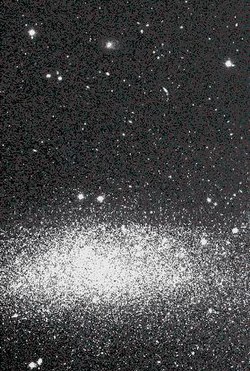Wolf-Lundmark-Melotte
| Wolf-Lundmark-Melotte | |
|---|---|
 Galaxie Wolf-Lundmark-Melotte | |
| Pozorovací údaje (Ekvinokcium J2000,0) | |
| Typ | Nepravidelná galaxie |
| Třída | IB(s)m[1] |
| Objevitel | Max Wolf |
| Datum objevu | 1909 |
| Rektascenze | 00h 01m 58,1s[1] |
| Deklinace | -15°27′39″[1] |
| Souhvězdí | Velryba (lat. Cetus) |
| Zdánlivá magnituda (V) | 11,0[1] |
| Úhlová velikost | 11,5′ × 4,2′[1] |
| Vzdálenost | 3,04 ± 0,11 Mly (930 ± 30 kpc)[2] ly |
| Rudý posuv | -122 ± 2 km/s[1] |
| Kupa galaxií | Místní skupina |
| Metalicita [Fe/H] | −1,28 |
| Označení v katalozích | |
| Principal Galaxies Catalogue | PGC 143 |
| Jiná označení | DDO 221, UGCA 444, PGC 143[1] |
| (V) – měření provedena ve viditelném světle | |
| Některá data mohou pocházet z datové položky. | |
Wolf-Lundmark-Melotte (zkráceně WLM) je nepravidelná galaxie na okraji místní skupiny galaxií, vzdálená přibližně 3 miliony světelných let od Země. Nachází se v souhvězdí Velryby a byla objevena v roce 1909 německým astronomem Maxem Wolfem. Charakter tohoto objektu podrobně popsali v roce 1926 astronomové Knut Lundmark a Philibert Jacques Melotte, podle nichž nese své jméno.[1]
Vlastnosti
WLM je nepravidelná galaxie třídy IB(s)m, což znamená, že má chaotický disk bez výrazné spirální struktury. Díky relativní izolaci od ostatních členů Místní skupiny je považována za jednu z nejméně narušených galaxií.[2]
Rotace galaxie vykazuje asymetrii, která může poukazovat na poruchy v jejím vnějším halo. Pravděpodobným zdrojem jsou dávné interakce či působení okolního prostředí.[3] Ačkoli se WLM nachází v izolovaném prostoru, existují náznaky takzvaného odtrhávání plynu (ram pressure stripping) vlivem okolního plynu.[4]
Hvězdná populace zahrnuje převážně hvězdy populace II (chudé na kovy) a menší množství mladých hvězd soustředěných především v jižní části systému.
Hvězdotvorba
Oblasti aktivní hvězdotvorby se ve WLM nacházejí hlavně v jižním sektoru galaxie. Při pozorování v ultrafialovém oboru se v těchto zónách objevují mladé hvězdy, jež zde vznikly v relativně nedávné době. Nejvýznamnější fáze hvězdotvorby proběhla během prvních několika miliard let po vzniku galaxie, kdy se metalicita zvýšila z [Fe/H] kolem −2,2 na přibližně −1,3.[5]
Kulová hvězdokupa
Wolf-Lundmark-Melotte obsahuje jedinou prokazatelnou kulovou hvězdokupu WLM-1. Její stáří se odhaduje na 12–13 miliard let a metalicita se pohybuje kolem [Fe/H] = −1,5.[6] WLM-1 je důležitá pro výzkum vývoje hvězdných populací v takto izolovaných galaxiích.
Pozorování Vesmírným dalekohledem Jamese Webba
Vesmírný dalekohled Jamese Webba pořídil dosud nejpodrobnější snímky WLM, na nichž lze rozlišit jednotlivé hvězdy.[7] Tyto snímky přispívají k lepšímu pochopení chemického složení a prostorového rozložení hvězd. Díky nízké metalicitě je WLM vhodnou analogií pro studium raných období vývoje galaxií.[8]
Význam
Izolovaná pozice a relativně původní hvězdné složení činí z WLM cenný objekt pro studium evoluce galaxií. Jelikož podléhá minimálním interakcím s okolím, umožňuje zkoumat procesy formování hvězd a galaktické dynamiky téměř v „původním“ stavu.
Odkazy
Reference
- ↑ a b c d e f g h NASA/IPAC Extragalactic Database [online]. [cit. 2025-01-16]. Dostupné online.
- ↑ a b McConnachie, A. W.; Irwin, M. J.; Ferguson, A. M. N.; Ibata, R. A.; Lewis, G. F.; Tanvir, N. Distances and metallicities for 17 Local Group galaxies. Monthly Notices of the Royal Astronomical Society. 2005, s. 979–997. doi:10.1111/j.1365-2966.2004.08514.x. arXiv astro-ph/0410489.
- ↑ Khademi, M.; Yang, Y.; Hammer, F.; Nasiri, S. Kinematical asymmetry in the dwarf irregular galaxy WLM. Astronomy & Astrophysics. 2021, s. A7. doi:10.1051/0004-6361/202140336.
- ↑ Yang, Y.; Ianjamasimanana, R.; Hammer, F.; et al. Evidence of ram-pressure stripping of WLM. Astronomy & Astrophysics. 2022, s. L11. doi:10.1051/0004-6361/202243307.
- ↑ Mondal, C.; Subramaniam, A.; George, K. A tale of two nearby dwarf irregular galaxies WLM and IC 2574. Journal of Astrophysics and Astronomy. 2021, s. 50. doi:10.1007/s12036-021-09761-z.
- ↑ van den Bergh, S. Updated Information on the Local Group. Publications of the Astronomical Society of the Pacific. 2000, s. 529–536. doi:10.1086/316548.
- ↑ Webb image shows Wolf-Lundmark-Melotte a dwarf galaxy full of stars [online]. [cit. 2025-01-16]. Dostupné online.
- ↑ MCQUINN, Kristen. Beneath the Night Sky in a Galaxy (Not Too) Far Away [online]. 2022-11-09. Dostupné online.
Externí odkazy
![]() Obrázky, zvuky či videa k tématu Wolf-Lundmark-Melotte na Wikimedia Commons
Obrázky, zvuky či videa k tématu Wolf-Lundmark-Melotte na Wikimedia Commons
Média použitá na této stránce
Autor: ESO, Licence: CC BY 3.0
This photo is a reproduction from a combination of two CCD frames observed with the 3.5-m New Technology Telescope (NTT) and the ESO Multi-Mode Instrument (EMMI). The field covers an area of approx. 7.8 x 11.5 arcmin. In the lower part is seen the WLM dwarf galaxy , fully resolved into individual stars. A few background galaxies that are unrelated to WLM are also visible. At the distance of WLM , about 3 million light years, the field corresponds to a projected area of about 10,000 x 6,000 light years. The frames were observed in the near-infrared I-band and each exposure lasted about 45 minutes. The seeing was about 0.9 arcsec, and the faintest stars that are visible have an I-band magnitude of 24. In this reproduction, North is to the left and East is down.
